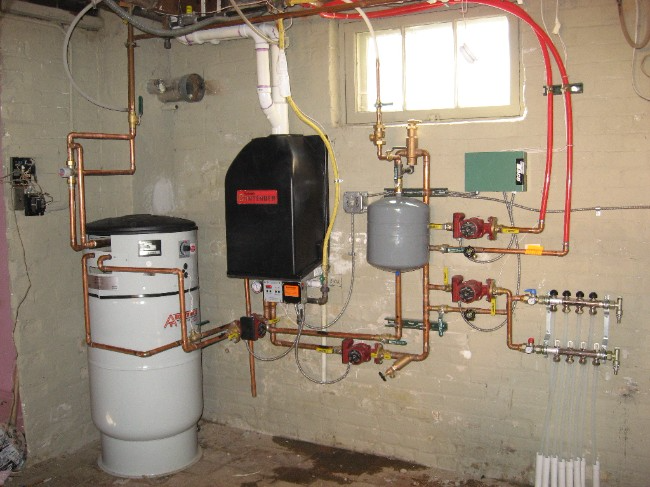What are the Massachusetts Heat Laws?
| . Posted in advice, laws, News - 45 Comments
Massachusetts apartment heating laws are specified in the State Sanitary Code, officially 105 CMR 410 The Minimum Standards of Fitness for Human Habitation. This regulation has the force of law and governs all things apartment, including winter heating requirements. This article was current as of February 26, 2024.

ModCon boiler system. CC-BY-SA Audetat.
Where to Heat
In layman’s terms, Massachusetts landlords must provide heat for every habitable room and room with a toilet, shower, or bathtub. Let’s parse this.
Habitable rooms are defined as rooms intended for living, sleeping, cooking, or eating. Habitable rooms do not include rooms containing toilets, bathtubs, or showers, but these rooms must still be heated because they are listed specifically in the heating part of the code. Habitable rooms do not include laundries, foyers, communicating corridors, closets, or storage spaces. Since these rooms are not considered habitable and are not specifically listed in the heating part of the code, these kinds of rooms do not have to be heated.
Note that temperature measurements (see below) are taken on an interior wall, five feet above the floor, five feet from an exterior wall.
What to Heat With
The sanitary code specifies two groupings of heat sources that are disfavored.
The first group of disfavored heat sources are not allowable because they are considered unsafe at any time. These are pressure-fed space heaters, parlor heaters, cabinet heaters, portable wick heaters and room heaters that have a supply tank less than 42 inches from the center of the burner. The prohibited fuels are kerosene, range oil, and number one fuel oil. None of these may be used at any time.
In case you are not familiar with these heat sources, parlor heaters are banned because they are a very hot fire hazard. The various oils are banned because their intended application is internal combustion engines, not housing, and they are a carbon monoxide risk if used indoors.
The second group of disfavored heat sources are not adequate. They are not considered unsafe, nor do they count for compliance. This list came into effect in April 2023 and consists of fireplaces, wood stoves, pellet stoves, and portable electric space heaters.
Other than that, there are no specifications for what is allowed. You can have steam heat, natural gas, oil, geothermal, electric, coal, or anything else you invent, as far as the state sanitary code is concerned. (Note that if you wanted to go nuclear, you would have to get permission from the United States Department of Energy and/or Nuclear Regulatory Commission. Let us know if you try it.)
How Much Heat
In rooms requiring heat (see above), there are three temperatures to know. You must be at least 64 °F starting at 11:01pm and running through 6:59am. You must be at least 68 °F between 7am and 11pm inclusive. And you may never exceed 78 °F.
When to Heat
The Massachusetts heating season runs from September 15 through May 31, inclusive. That means officially we have three months of spring, summer, and fall in Massachusetts. The rest is legally considered the dead of winter! (Note: The heating season used to be through June 15 until a revision was promulgated April 2023. The revision reflects work done by MassLandlords in response to climate change.)
What if the tenant pays for heat?
Tenants can pay for heat if it’s written into a rental agreement. No verbal agreements allowed!
If the written agreement says the tenant needs to provide fuel, but the tenant doesn’t provide fuel, and the temperature falls below the requirements, the landlord is not responsible. But even without fuel, the equipment must be in working order.
What if the Heat Suddenly Breaks?
Heating systems preferentially choose to fail on New Year’s Eve, Valentine’s Day, and the evening of your kid’s recital. They like the attention. If the heat breaks, you have an immediate violation of the state sanitary code. Rent might be withheld. You also have a risk of frozen pipes, hotel bills, and inspector fines. So there are real good reasons why you need to drop everything and investigate right away.
Sometimes you get lucky and the pilot light just went out. These can be relighted if you follow the manufacturer’s instructions. If the pilot won’t light, or if there are signs of a leak or explosion, call a licensed tradesperson immediately. It’s possible to get an older boiler or furnace repaired or replaced within 24 hours or before any serious heat is lost from the building. Keep calling plumbers until you find one who can be there right away.
If you haven’t yet invested in good communication with your tenants, now is the time. Text or call each tenant to let them know your plan. If the heating system has failed entirely, and if there will be several days’ delay in replacement, you may want to consider getting spare electric space heaters and distributing these to affected tenants. Anything with a hot exposed coil is a fire hazard in a rental; the oil filled ones are safer because the heating element is not accessible when used per instructions. You may need to buy space heaters or you may be able to ask your local message board to borrow some. Also place temporary heaters in the basement to delay or prevent frozen pipes. Offer to pay the electric bill in exchange for the tenant using the heaters or to discount the rent, because space heaters are not compliant for code purposes. Tell them you want to prevent frozen pipes. Make sure your heaters are rated for your electrical system or vice versa. Do not use very old heaters, which may pose a fire hazard.
In the basement, if you have poor lighting, set up spot lights or other temporary lighting so that your plumber can work quickly and accurately. Expect a large bill.
An ounce of prevention is worth a pound of cure. Inspect your heating systems late in the summer. Know the age of your furnaces or boilers and have a savings goal to replace them preventatively at a time convenient for all concerned.
Future Changes to the Massachusetts Heating Laws
The MA Executive Office of Health and Human Services, Department of Public Health has proposed changes to the state sanitary code. They are considering outlawing wood because of its harmful contribution to global warming. They are also considering eliminating all types of space heaters, and making other changes to the Massachusetts apartment heat laws. Stay subscribed to our newsletter to learn if and when these changes to the Massachusetts heat laws take effect.
Members can talk to experienced landlords about heating issues and more.




